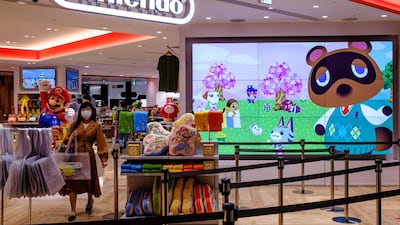Nintendo’s stock has surged to levels not recorded since the height of Wii mania.
Shares in the videogame maker climbed 2.7 per cent in Tokyo Thursday, lifting the stock past the 50,000 yen (Dh1,719/$468) barrier for the first time since September 2008. Shares have in recent days been driven by rising fears of a coronavirus second wave, and were boosted further by the announcement of new Pokemon games for both Switch and mobile.
The announcement of the Pokemon games by Nintendo and Pokemon Co., in which Nintendo owns a significant stake, was long overdue.
The Nintendo 64 game Pokemon Snap will be getting a sequel on Switch, while a paid expansion was announced for the Switch titles Pokemon Sword and Shield, which have sold more than 17 million copies. Pokemon developers also said they would share news on a further “big project” on June 24.
Nintendo’s Switch console-handheld hybrid was a hit product during global lockdowns, sold out in many regions and was buoyed by the surprising success of laid-back social simulator Animal Crossing: New Horizons. With cases reappearing in Beijing and increasing in the US, the prospect of more lockdowns has helped boost the shares out of its two-month plateau.
“The stock had been struggling the past two months with demand for stay-at-home stocks dropping as the economy re-opened and the state of emergency in Japan was lifted,” Katsuyuki Fujii, an analyst at Asunaro Investment, said on Thursday. “But as fears for the second wave of coronavirus grow, people are taking a second look at those stocks.”
Shares hit an all-time high of 73,200 yen in November 2007, when the Wii was the must-have hit product.
Investors and gamers alike have been wondering what the company has in store for the rest of the year, with Nintendo’s slate
looking remarkably bare. Beyond Pokemon, there are almost no titles in its hit franchises with set release windows – despite Sony and Microsoft both preparing to spend big as they roll out new generations of their PlayStation and Xbox consoles this holiday season.
“The shares have remained range-bound due to concerns over the lack of upcoming titles,” Daiwa Securities analyst Takao Suzuki wrote in a note dated June 9 in which he raised his price target to 55,000 yen. “We look for new title announcements and a surge in digital sales, other than those for Animal Crossing: New Horizons.”
Sony announced more than 20 new titles when it showed off the PlayStation 5 for the first time last week, while Microsoft showcased more than a dozen Xbox Series X titles in May. At Nintendo’s most recent earnings in May it had no major titles listed for release in the rest of 2020.
All eyes will now be on the Kyoto gamemaker to say that it will hold one of its own “Nintendo Direct” online presentations, which has been the company’s favoured method of revealing titles in recent years. It has been almost a year since Nintendo held a major one of these announcements in which it unveiled key new titles, with the Mario Kart and Zelda franchises among those due to receive new entries.
Beyond this year’s slate, hopes are also high for the company in 2021. JPMorgan analyst Haruka Mori on June 10 raised her price target for Nintendo by 18 per cent to 52,000 yen, saying that the Covid-related demand growth didn’t look temporary. “We believe the Covid-19 pandemic has expanded earnings opportunities for the Nintendo Switch platform beyond one-off special demand,” Ms Mori wrote.
Despite a lack of short-term causes for the stock to move, Nintendo has multiple opportunities in the mid-term, Ms Mori said in a note, citing catalysts for 2021 that included a possible new Switch model, a price cut for existing models and advances for its team-up with Tencent in China.

